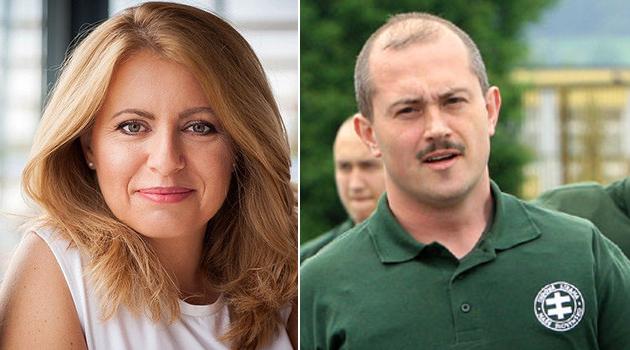Slovak President-elect says a single court decision cannot solve the problem of extremism and Fascism

On 29 April, the Slovak Supreme Court rejected a motion from the Slovak Prosecutor-General to dissolve the extreme-right Kotleba-People’s Party Our Slovakia party (Kotleba-Lidová strana Naše Slovensko – LSNS). Slovak President-elect Zuzana Čaputová responded to the verdict by saying that no single court decision can solve the problem of extremism and Fascism for the country.
The President-elect believes a social atmosphere free of hatred can be achieved above all by offering decent policies that yield actual solutions to problems. “We can discuss whether the motion was well-prepared, or whether it was submitted in a timely manner, or whether the court waited too long to make its decision in the matter,” she posted to her Facebook profile.
“However, we must not believe that any court could resolve the problem with extremism and Fascism for us through a single decision. We will take personal stances on this issue, and all of us should contribute to doing that,” she posted to her Facebook profile.
Outgoing President Andrej Kiska expressed a similar view of the verdict. “We must defeat extremism during elections, in the political contest,” he said.
“We must defeat extremism by demonstrating to the people who are voting for these extremists that policy can be well-designed and that politics brings the people actual results. That is the way to get extremism out of Slovakia and we must work on it,” he said.
After taking office in 2014, Kiska refused to receive either the party’s chair, Kotleba, or any other representative of the LSNS, saying that Kotleba is a Fascist. Slovak Prime Minister Peter Pellegrini, the vice-chair of the strongest party in the Government, “Direction-Social Democracy” (Směr-sociální demokracie – Směr-SD), stated that he respects the Supreme Court decision but also indirectly criticized LSNS politicians.
“I remain convinced that any support for Fascism, any work done with its symbols, or with Holocaust denial, or with casting doubt on the suffering of tens of millions of people contravenes democracy and there is no place for it in a modern society,” Pellegrini posted to social media. The task of the democratic parties, in his view, is to offer those sympathizing with such controversial subjects solutions to the most serious society-wide problems that do not include hateful ideology.
Irena Biháriová, the vice-chair of the Progressive Slovakia (Progresivné Slovensko – PS) movement, sharply criticized the court’s decision. “The decision by the Supreme Court today has legalized a state of affairs in which this party can now, through its leading representatives and candidates, continue to doubt the Holocaust, to make vulgar remarks about the Slovak National Uprising, to malign minorities, and to make incitement of hatred their electoral program,” she said.
“The party can promise to raze settlements to the ground with bulldozers, to create a party militia, to establish collaboration with neo-Nazis abroad, and to write pamphlets about the necessity of taking a eugenic approach to people living with disabilities or Roma. From this day forward, such actions by this political party and its representatives will be established as constitutional and a legally correct method of political competition,” Biháriová said.
Another leading politician to take a stand against the LSNS in particular was Slovak Justice Minister Gábor Gál of the smaller coalition party Most-Híd (“Bridge”). The Justice Minister said the LSNS still makes use of elements of Fascism in its politicking.
The LSNS espouses the legacy of the WWII-era Slovak State, which was an ally of Nazi Germany. The party also objects to Slovakia’s membership in the EU and NATO and objects to Romani people as such.
